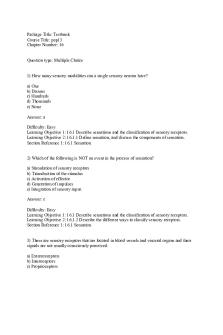Ch. 16 Notes PDF

| Title | Ch. 16 Notes |
|---|---|
| Course | AP United States History |
| Institution | High School - USA |
| Pages | 2 |
| File Size | 71.1 KB |
| File Type | |
| Total Downloads | 36 |
| Total Views | 173 |
Summary
American Pageant Notes...
Description
Kevin Hou
Chapter 16 Notes
11-29-17
“Cotton is King”
Invention of cotton gin in 1793 made cotton the most farmed cash crop. Cotton farming became an economic spiral: more farmers came down to plant, they imported more slaves, they made more profits, and then even more farmers came down to get a share in the profits. o Northern shippers also reaped the rewards of a booming cotton economy. The prosperity of both the north and the south relied on slavery. U.S. accounted for more than 50% of the world’s cotton supply. Britain relied on the U.S. cotton. The south acknowledged this and it made them feel more powerful. o The U.S. could stop shipments of cotton to Britain if war broke out and Britain’s economy would collapse.
The Planter “Aristocracy”
In the years leading up to the civil war, south was more of an oligarchy than a democracy. o A small select group of families owned much of the economic and political power of society. o Southern children could have the best education, best opportunities, and a lot of leisure time. Wealthy women on plantations would often times command an army of servants.
Slaves of the Slave System
Economic state of the south became monopolistic. o More and more land became occupied by a small select group of families. Financially unstable south. o Slaves and land were a heavy investment. A group of slaves could be wiped out by disease or run away. South lamented the fact that they were so heavily dependent on the North’s industry.
The White Majority
Only a small handful of whites were the successful plantation owning planters who lived in columned mansions. o Many whites did not own slaves – they were known as poor white trash. o White trash opposed abolition because if blacks were given rights, the incompetent whites would take the place of slaves at the bottom of the social hierarchy. Here, the logic of economics merged with the illogic of racism to form the slave system we know.
Free Blacks: Slaves Without Masters
Some blacks earned freedom by purchasing freedom with earnings from after-hour laboring.
Kevin Hou
Chapter 16 Notes
11-29-17
Free blacks were a “third race”. They could not work in certain jobs, could not testify against whites in court. They were not subject to the oppression that slaves faced however. o Northerners were often times more opposed to free blacks than the south. The north was more racist....
Similar Free PDFs

Ch. 16 Notes
- 2 Pages

314 ch 16 - Lecture notes 16
- 14 Pages

TAM 2200 Notes Ch. 15 & Ch. 16
- 7 Pages

Ch16 - Lecture notes ch 16
- 44 Pages

Abnormal Psych- Ch. 16 Notes
- 5 Pages

Chapter 16 Examples - Ch 16
- 1 Pages

Ch 16 - Test bank
- 20 Pages

Ch.16 practice questions
- 6 Pages

Ch 16 Textbook Solutions
- 63 Pages

Ch. 16 Lecture Outline
- 10 Pages

ch 16 ifrs
- 63 Pages

Webassign problems ch 16
- 20 Pages
Popular Institutions
- Tinajero National High School - Annex
- Politeknik Caltex Riau
- Yokohama City University
- SGT University
- University of Al-Qadisiyah
- Divine Word College of Vigan
- Techniek College Rotterdam
- Universidade de Santiago
- Universiti Teknologi MARA Cawangan Johor Kampus Pasir Gudang
- Poltekkes Kemenkes Yogyakarta
- Baguio City National High School
- Colegio san marcos
- preparatoria uno
- Centro de Bachillerato Tecnológico Industrial y de Servicios No. 107
- Dalian Maritime University
- Quang Trung Secondary School
- Colegio Tecnológico en Informática
- Corporación Regional de Educación Superior
- Grupo CEDVA
- Dar Al Uloom University
- Centro de Estudios Preuniversitarios de la Universidad Nacional de Ingeniería
- 上智大学
- Aakash International School, Nuna Majara
- San Felipe Neri Catholic School
- Kang Chiao International School - New Taipei City
- Misamis Occidental National High School
- Institución Educativa Escuela Normal Juan Ladrilleros
- Kolehiyo ng Pantukan
- Batanes State College
- Instituto Continental
- Sekolah Menengah Kejuruan Kesehatan Kaltara (Tarakan)
- Colegio de La Inmaculada Concepcion - Cebu



